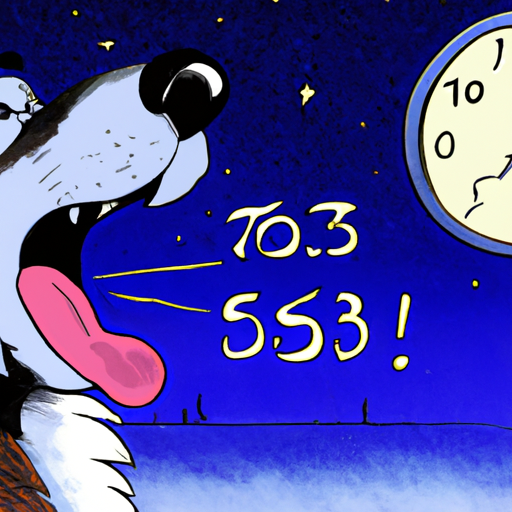You’re Not Alone – Nighttime Howling in Dogs
We’ve all been there. You’re cozily tucked into bed when suddenly, your faithful canine companion starts howling into the darkness. It’s 3 AM and the unsettling chorus pierces the still night, jolting you from sleep.
This behavior might leave you perplexed and frustrated. Why does your dog insist on performing their solo at such an ungodly hour? You’re not alone in this quandary, and there are logical explanations behind this seemingly eerie behavior.
Understanding Your Dog’s Nocturnal Serenade
Dogs, like their wolf ancestors, are instinctively drawn to howling. It’s a primal form of communication originating from their wild roots. Here’s a breakdown of some common reasons:
- Separation Anxiety: Dogs are pack animals and being alone can trigger anxiety, leading to howling.
- Attention Seeking: Dogs might howl to get your attention, especially if it’s rewarded in the past.
- Response to Sounds: High pitched noises like sirens or musical instruments can trigger howling.
The Deeper Science Behind the 3 AM Howls
Believe it or not, there’s a science to your dog’s 3 AM howls. Dogs have an exceptional sense of hearing. They can detect sounds that are far beyond the range of our human ears. At night, when the world is quieter and human activity has decreased, these sounds become even more apparent to our canine friends.
| Time | Level of Disturbance | Dog’s Hearing Sensitivity |
|---|---|---|
| Day | High | Normal |
| Night | Low | Enhanced |
This enhanced sensitivity, combined with their naturally higher hearing frequency range, makes the night a symphony of sounds for dogs. What may seem like a peaceful night to you could be a cacophony to your furry friend, triggering their instinctive howling.
Soothing Your Canine’s Midnight Melodies
Now that you understand why your dog might be howling at night, what can you do about it? Here are some suggestions:
- Create a Comfortable Environment: Make sure your dog has a warm, comfortable space to sleep.
- Maintain Routine: Regular feeding, playtime, and bedtime can provide a sense of security.
- Sound Therapy: Soft music or white noise can mask triggering sounds.
- Professional Help: If your dog’s howling persists, it might be worth seeking professional help.
Frequently Asked Questions (FAQ)
Why does my dog howly only at night?
Dogs might howl more at night due to enhanced hearing sensitivity in quieter environments.
Are certain breeds more likely to howl at night?
Breeds with stronger ties to their wolf ancestors, like Huskies or Alaskan Malamutes, may be more prone to howling.
Should I punish my dog for howling at night?
No. It’s crucial to understand that howling is a form of communication for dogs. Instead, try to address the root cause of the howling.
Remember, your dog isn’t trying to ruin your sleep. They’re just responding to their environment and instincts. Understanding and compassion go a long way in strengthening the bond between you and your nocturnal singer.



